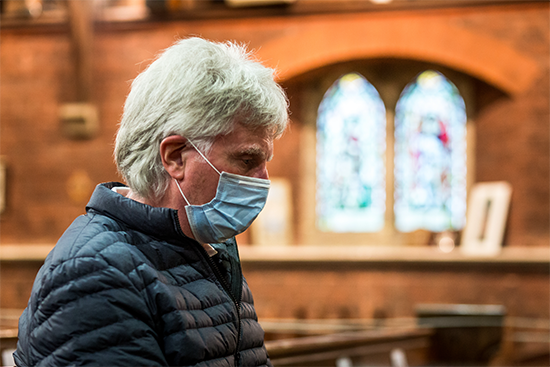
February -
March 2022
Stewardship: Past the Offering Plate
------------------
|





Returning to Church in a Post-Pandemic World
By Brad Ransom
According to a March 2020 Gallup poll, church membership continued to decline last year, dropping below 50% for the first time in the eight-decade trend. “In 2020, 47% of Americans said they belonged to a church, synagogue, or mosque, down from 50% in 2018 and 70% in 1999.”
We only thought the 2020 pandemic was the problem. Maybe it wasn’t after all. According to the poll cited above, the problem has been brewing for more than a dozen years. Americans who attend church are in the minority for the first time in U.S. history. We have been asking, “Why aren’t more people coming back to church after the pandemic?” We should have been asking, “Where are the true disciples?” No doubt, the pandemic shed important light on the topic, but I believe we need to be looking at a deeper issue.
The church’s interpretation of the Great Commission (Matthew 28:19-20) may be the real problem. It seems many churches have focused on getting more church members, when they should have been focused on what it means to make true disciples. If we make true disciples, we will automatically have more church members, but the opposite is not necessarily true.
According to Matthew 28:19-20, we are to make true disciples (following salvation and baptism) by teaching them to obey everything the Bible teaches us. This is the true challenge. Churches have whittled away their ministries, schedule of services, and activities to allow families more time together for school functions, extracurricular sports programs, gymnastics, and a plethora of other things. But where has that left churches opportunities for true discipleship? Randall House points out this important concept with their slogan “1/168.” What does this mean? We all have 168 hours each week. Most Christians only give one hour a week to church. And one in 168 is not enough!
True discipleship cannot happen in an hour per week. It takes more—much more. Although I am not against churches streamlining the ministry menu and not expecting members to be at church or church activities three to four nights per week, I am against the idea of immature, baby believers who stay that way.
So, how do we make true disciples in today’s busy world? Though I cannot offer an exhaustive plan, consider some simple steps to help most churches improve their discipleship.
Develop a plan. Your church needs a plan for how it will disciple people. If you don’t have a system or written plan, it won’t happen. Some may get haphazardly led through a process, but more won’t without a defined plan. Too many people slip through the cracks without a plan that guides everyone through the same steps. I suggest LifeTrack or another similar class to get people started.
LifeTrack is typically one hour per week for three to four weeks so you can introduce new Christians or new members to the beliefs, mission, vision, and values of
your church and get them plugged into small groups and
discipleship.
-
Start people where they are. In today’s postmodern world, churches cannot assume every person who comes through the doors believes the same way. Some will have a church background while others will not, and they won’t all have the same worldview. Discipleship for former skeptics, agnostics, or atheists may begin with an apologetic look at creation, the fall of man, the inerrancy of Scripture, the physical death and resurrection of Christ, and other fundamental issues.
Discipleship for those from a church background who already believe the fundamentals can start elsewhere. Therefore, your discipleship program must adapt to individuals. A prepackaged discipleship program with 13 lessons may not be right for everyone.
-
Hold people accountable. Do everything you can to ensure everyone in your church goes through the discipleship process. Before people are allowed to serve, make sure they are on a discipleship pathway. Certainly, before anyone leads or is appointed to a committee, he or she should go through the discipleship process. Celebrate it and make it a “big deal” when people complete various stages. Acknowledge them before the congregation, so everyone will see the value your church places on discipleship.
-
Preach for discipleship. Use your valuable pulpit time to disciple people. Teach them the Bible! Preaching expository sermons and using the text as the content of the message is the best way to teach the Scriptures systematically. Don’t shy away from truth or hard topics but read what the Bible says and preach “thus saith the Lord!”
-
Make discipleship something everyone in your church does. If your church values discipleship, people will notice. If you talk about it, invest money in it, and celebrate it when it happens, it will eventually become the culture of your church. And that is when discipleship really takes place because culture wins every time.
Everyone should know they can’t serve unless they commit to discipleship. Leaders know they can’t lead unless committed to discipleship. New people quickly learn they are expected to commit to discipleship. And more will. True, everyone won’t, but most will. What would it mean to your church if 80% of your people committed to ongoing discipleship?
Discipleship is a lifelong process. LifeTrack and discipleship groups are a great place to start, but they are not a comprehensive plan. Being a true disciple means growing in Christ for the rest of our lives. If more churches focus on making true disciples, our churches will be healthier, and they will grow numerically because making true disciples means teaching them to make disciples. This is an ongoing process that should never stop.
No doubt, the COVID-19 pandemic caused much stress in the church, but maybe God can use it to throw light on the deeper and more pressing need for discipleship in most churches. Making disciples is the essence of the Great Commission, and every church should make it a priority.
Start by seeking God regarding how your church can effectively implement discipleship as a regular part of its DNA. Talk to the leaders in your church and help them understand the importance of discipleship. Develop the resources you need and then take the leaders through those resources first. Implementing a new idea is never easy, but it’s worth the prayer, time, money, and effort if it results in true and growing disciples.
About the Author: Dr. Brad Ransom is director of church planting and chief training officer for North American Ministries. Contact Brad: brad@nafwb.org.
|
|

